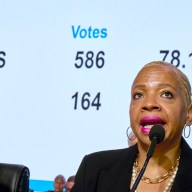TORONTO – The Canadian dollar closed flat against its U.S. counterpart Tuesday following reports that the Canadian economy unexpectedly contracted in November and American consumer confidence sharply deteriorated in January.
The loonie was unchanged from Monday at 99.72 cents US, well off the highs of the session, as Statistics Canada announced that the country’s real gross domestic product edged down 0.1 per cent in November.
The weaker GDP comes after showing no growth in October. Economists had looked for the economy to grow by 0.2 per cent.
Statistics Canada said lower output in the energy sector accounted for most of the November decline, as oil and gas extraction fell 2.5 per cent.
“While most of the downside surprise was heavily concentrated in one category, no sectors stepped up to provide any offset, which shows yet again that underlying activity remains lacklustre at best,” said BMO Capital Markets deputy chief economist Doug Porter.
In the U.S., The Conference Board, a private research group, said that its Consumer Confidence Index now stands at 61.1, down from a revised 64.8 in December. Economists had expected a January reading of 68.
The Conference Board said that even though consumers were more upbeat about jobs, they were less optimistic about income prospects.
The loonie had traded as high as 100.35 cents US earlier in the session amid promises by European Union leaders to stop overspending.
The hope is that a new treaty arrived at Monday will help EU countries deal decisively with the region’s debt woes.
The summit of EU leaders “yielded a promise to support balanced-budget rules with fines on high-deficit countries,” observed Scotia Capital currency strategist Eric Theoret.
“And German demands will see that ESM funds are only available to member countries that ratify the fiscal compact.”
The ESM, or European Stabilization Mechanism, is the permanent rescue funding program that will succeed the temporary European Financial Stability Facility and European Financial Stabilization Mechanism in the eurozone. It is expected to be launched in July.
Traders were also hopeful that Greece is getting closer to a deal with its private creditors to knock €100 billion off the country’s national debt in exchange for cash payments and new bonds with longer maturities.
Greek Prime Minister Lucas Papademos said Tuesday that he hoped negotiations with private and rescue creditors would be finished this week. An agreement is necessary if Greece is to receive a second bailout loan agreement, worth €130 billion.
Commodity prices weakened considerably following the release of the U.S. data mid-morning.
The March crude contract on the New York Mercantile Exchange lost 30 cents to US$98.48 a barrel.
Copper prices moved lower, down four cents to US$3.79 a pound. Still, copper has surged 10.3 per cent this month, partly on hopes that China, the biggest consumer of the metal, which is viewed as an economic bellwether as it is used in so many industries, is set to further relax lending standards to encourage growth.
Gold Bullion prices were still positive with the April contract up $6 to US$1,740.40 an ounce.
















